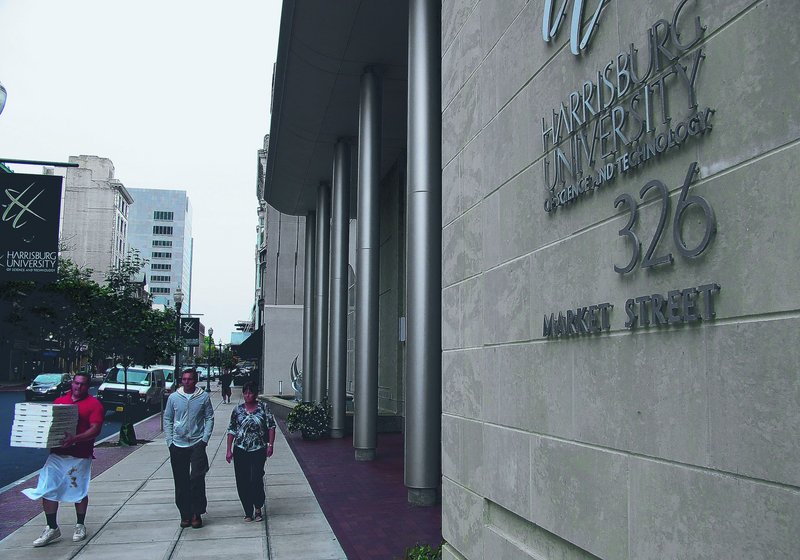HARRISBURG, Pa. – A central Pennsylvania technological college with fewer students than many Facebook users have friends is blacking out social media for a week.
The bold experiment at Harrisburg University of Science and Technology — which has drawn praise, criticism and even a jab on late-night TV –means students and staff can’t access Facebook, Twitter and a host of other ubiquitous social networks while on campus.
Provost Eric Darr said the exercise that began Monday is not a punishment for the school’s 800 students, nor a precursor to a ban, but a way for people to think critically about the prevalence of social media.
The blackout comes on the heels of a report that Web users in the U.S. spend more time socializing on Facebook than searching with Google, according to data released last week from researchers at comScore Inc.
Still, Darr said he can’t believe the controversy generated in the Twitterverse, blogosphere and academia, with some accusing the school of inflicting “a terrible thing and an infringement upon people’s rights.”
“By and large, the students are supportive of the whole exercise and don’t get so worked up over it,” Darr said.
On campus, attempts to log in to MySpace or LinkedIn return the message: “This domain is blocked.” E-mail, texting and other Web surfing is still allowed, but not instant-messaging.
Student Ashley Harris, 22, said the blackout has freed her to concentrate on her classwork instead of toggling on her laptop between social networks and her lessons.
“I feel obligated to check my Facebook. I feel obligated to check my Twitter. Now I don’t,” Harris said. “I can just solely focus.”
Part of Harris’ willingness to disconnect stemmed from her feeling that the experiment demonstrates the young university’s focus on innovation. The private nonprofit institution was founded in 2003 and operates out of a 16-story building in downtown Harrisburg, the state capital about 95 miles northwest of Philadelphia.
Adam Ostrow, editor-in-chief of the social media news site Mashable.com, said he’d be interested to see if the university collects any hard metrics from the ban, such as better class attendance or more assignments turned in on time.
But he doesn’t think a blackout is feasible over the long term. Though Facebook has been blocked in some workplaces as a time-waster, it is a crucial tool for college students to coordinate social schedules, organize events, plan study sessions and collaborate on assignments.
Ironically, the university hosted a social media summit on Wednesday — mid-blackout. That caused some angst for guest speaker Sherrie Madia, communications director for the University of Pennsylvania’s Wharton School, who, like many, is used to tweeting during conferences.
She said the buzz around the ban has started a much-needed conversation about effective use of social media and how to balance online life with the world offline.
“Do we really want to be enslaved to Facebook or Twitter?” Madia said. “Once you create anything in social media, you have to feed the beast. When you stop adding content, you disappear.”
The university has created course work around the ban, and some students will write essays about their experience. Comedian Jimmy Fallon joked in Monday’s late-night monologue that he knows the title of those essays: “We All Have Smart Phones, Dumbass.”
Darr acknowledged students can use smart phones to bypass the university’s computer network or go to a nearby hotel for unblocked WiFi. And at a tech-centric school, he said, some students will try to get around the firewall just to prove they can.
Yet if people feel that compelled to check status updates or Twitter replies, that’s important to know.
“I want an honest reaction to the experiment,” Darr said.
The provost also confessed to some trepidation: College officials also can’t use social networks this week for student recruiting, business networking or curriculum planning.
“Next week, I will be as thankful as the next person we’re back on social media,” Darr said.
So will junior Giovanni Acosta, 21, who said he’s been texting up a storm trying to coordinate social events without Facebook and Twitter.
But student Dan Warseck, 36, said it doesn’t bother him – he prefers face-to-face communication and doesn’t even have texting on his phone.
“I’m not one of these people who puts their life online,” Warseck said. “My friends have my phone number if they really need to get in touch with me.”
Harris thought for sure she’d cheat on the blackout, but to her surprise she’s embraced it – although she does draw a line in the sand.
“I don’t know if I could turn off my phone,” Harris said. “I don’t know if I could be that liberated.”
Send questions/comments to the editors.



Success. Please wait for the page to reload. If the page does not reload within 5 seconds, please refresh the page.
Enter your email and password to access comments.
Hi, to comment on stories you must . This profile is in addition to your subscription and website login.
Already have a commenting profile? .
Invalid username/password.
Please check your email to confirm and complete your registration.
Only subscribers are eligible to post comments. Please subscribe or login first for digital access. Here’s why.
Use the form below to reset your password. When you've submitted your account email, we will send an email with a reset code.